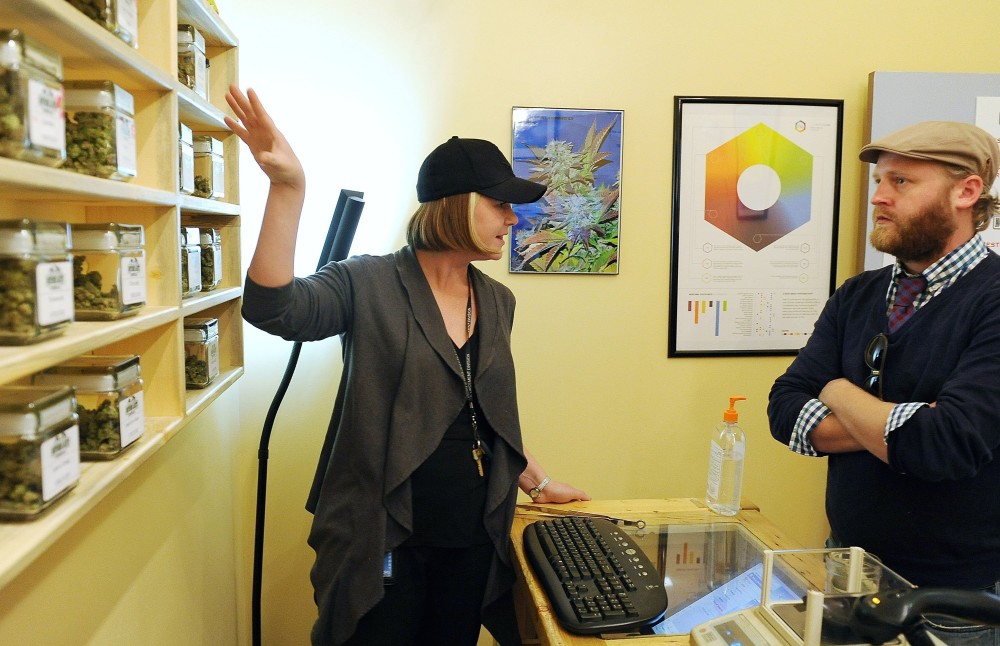By Peter Hecht
The Sacramento Bee.
Retired Silicon Valley engineer Angelo Mallol, 56, turned out Sunday for a seminar on how to start a small business — in the pot trade.
He asked questions as instructor Gerry Bedore of the Cannabis Career Institute spoke about emerging opportunities for entrepreneurs wanting to enter California’s medical marijuana market and cash in on a likely 2016 state ballot initiative to legalize recreational pot use.
The Cannabis Career Institute, founded by a Los Angeles marijuana activist and pot deliveryman known as “The Cannabis Warrior,” held a daylong Sacramento program on how to open cannabis businesses, from niche bakeries and organic gardens to marijuana distribution services.
Mallol recently retired to raise cattle and grow hops in Yuba County. He came to the seminar at the Hampton Inn in North Natomas because he has an idea: Blend California craft beer and marijuana into a frothy concoction — cannabis beer — that promises both a tasty buzz and some high-minded relaxation.
“I’m really waiting for 2016,” said Mallol, addressing the expectation that Golden State voters will legalize marijuana beyond medical use, joining Colorado, Washington, Oregon, Alaska and the District of Columbia in sanctioning recreational weed. “I think 2016 is going to open the gates for a lot of entrepreneurs in California.”
With hundreds of medical marijuana dispensaries, California already boasts the United States’ largest marijuana economy. But unlike states that have passed rigorous regulations on cannabis businesses, the $1 billion-plus California pot economy operates under nebulous guidelines passed by the state Legislature in 2003, seven years after voters approved the Proposition 215 medical marijuana law.
In California, state law merely says that people with doctors’ recommendations for cannabis use can “associate” to “collectively or cooperatively cultivate marijuana for medical purposes.”
Claiming pot businesses were illegally profiting in the state’s “unregulated free-for-all” environment, federal agents in 2011 and 2012 launched sweeping raids in California on medical marijuana operations.
Numerous legislative efforts to regulate California’s cannabis commerce have since failed, even after the Justice Department declared in 2013 that federal agents were unlikely to raid marijuana business in states that enacted “robust controls.”
On Sunday, the murky California picture didn’t seem to curb enthusiasm as Bedore encouraged the cannabis conference attendees about potential business opportunities.
“This business will be so different (with legalization of recreational use) in 2016 and the implementation in 2017,” said Bedore, a resident of Paradise in Butte County, who describes himself as a cannabis business consultant. “If you are floundering and flopping when the market changes, what are you going to do?”
The Cannabis Career Institute was founded by a man known as Robert “The Cannabis Warrior” Calkin. A rock musician with a band called Rude Awakening, he broke into the pot business with a then-illegal delivery service before the passage of Proposition 215.
Now he conducts training seminars for the legal cannabis economy and runs an online job site, Cannajobs, which he bills as the Monster.com for the pot industry.
In a phone interview from Los Angeles, Calkin said California — despite its lack of marijuana industry rules — is the best place for people to enter the pot business.
“California is really the only place where the average Joe can start right now,” he said.
More than a dozen people paid $200 to $349 for the Cannabis Career Institute program in Sacramento. The instructors weren’t promising marijuana riches as they lectured on not-for-profit medical marijuana patient collectives, plant-growing science, “bud tending” and dispensary management.
Calkin’s program stressed obtaining proper local permits and state tax licenses for marijuana businesses, while starting small and expanding slowly to avoid drawing attention from the feds or local authorities. He also touted medical marijuana delivery services over storefront dispensaries.
“Once you become ‘Big Weed,’ that’s when they take you down,” he said. “But for guys who are making under $100,000 a year, nobody is going to knock on their door. They’re not that big of a player.”
People such as Danni Maloney, who has worked 25 years in the hardware business, came out Sunday to hear about pot’s prospects.
“I’m here to find out the risks and the opportunities,” Maloney said.
buy female viagra online pavg.net/wp-content/themes/twentytwentyone/inc/en/female-viagra.html no prescription
Despite the seminar’s cautionary tone, Sacramento resident Richard Mathieu, 42, talked about buying land in far northern Siskiyou County and becoming a licensed cannabis farmer in a state-regulated marijuana economy.
“I think there is a huge demand out there,” he said, “and the supply can’t meet the demand.”














































































































































































































































































































































































